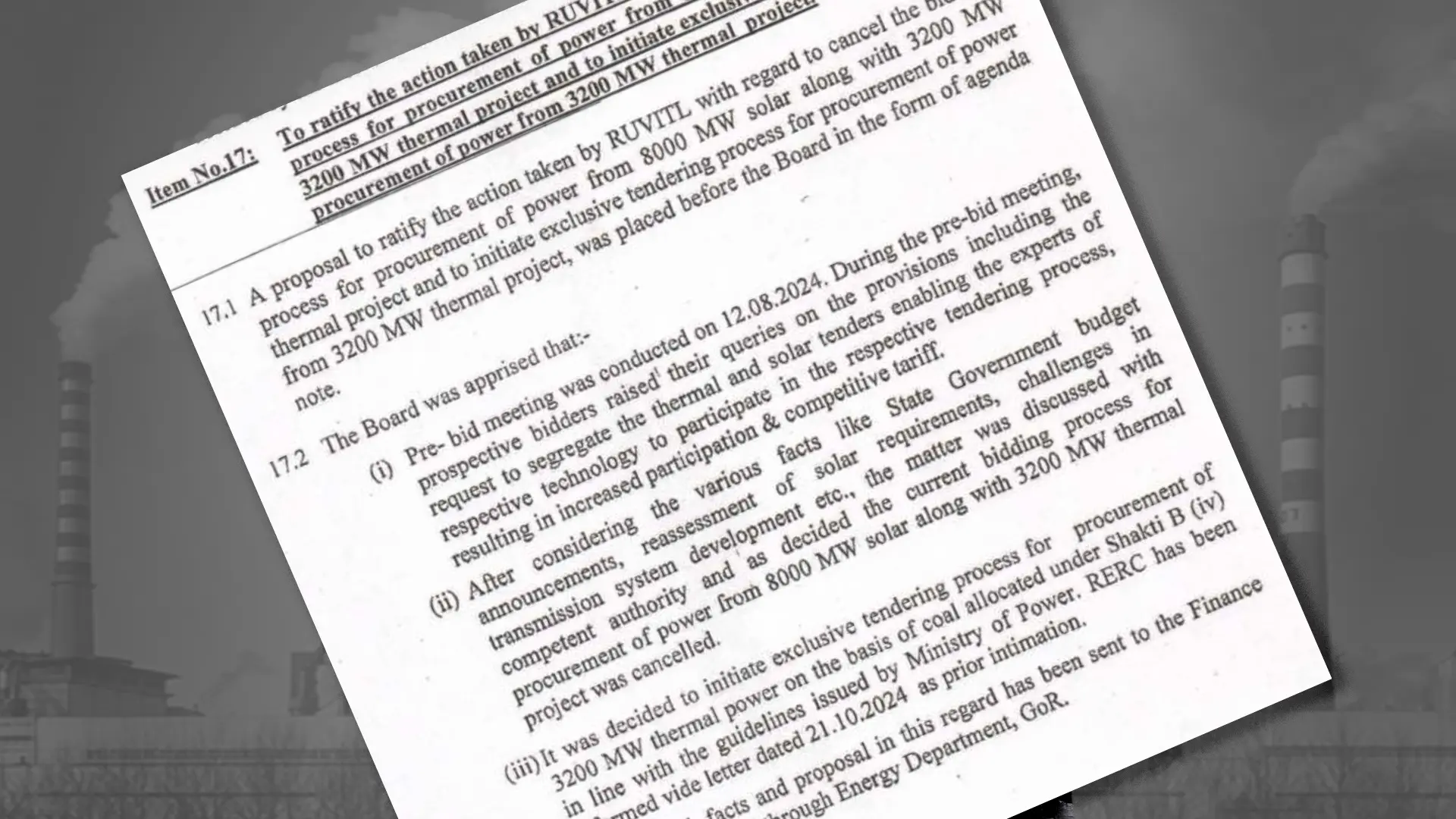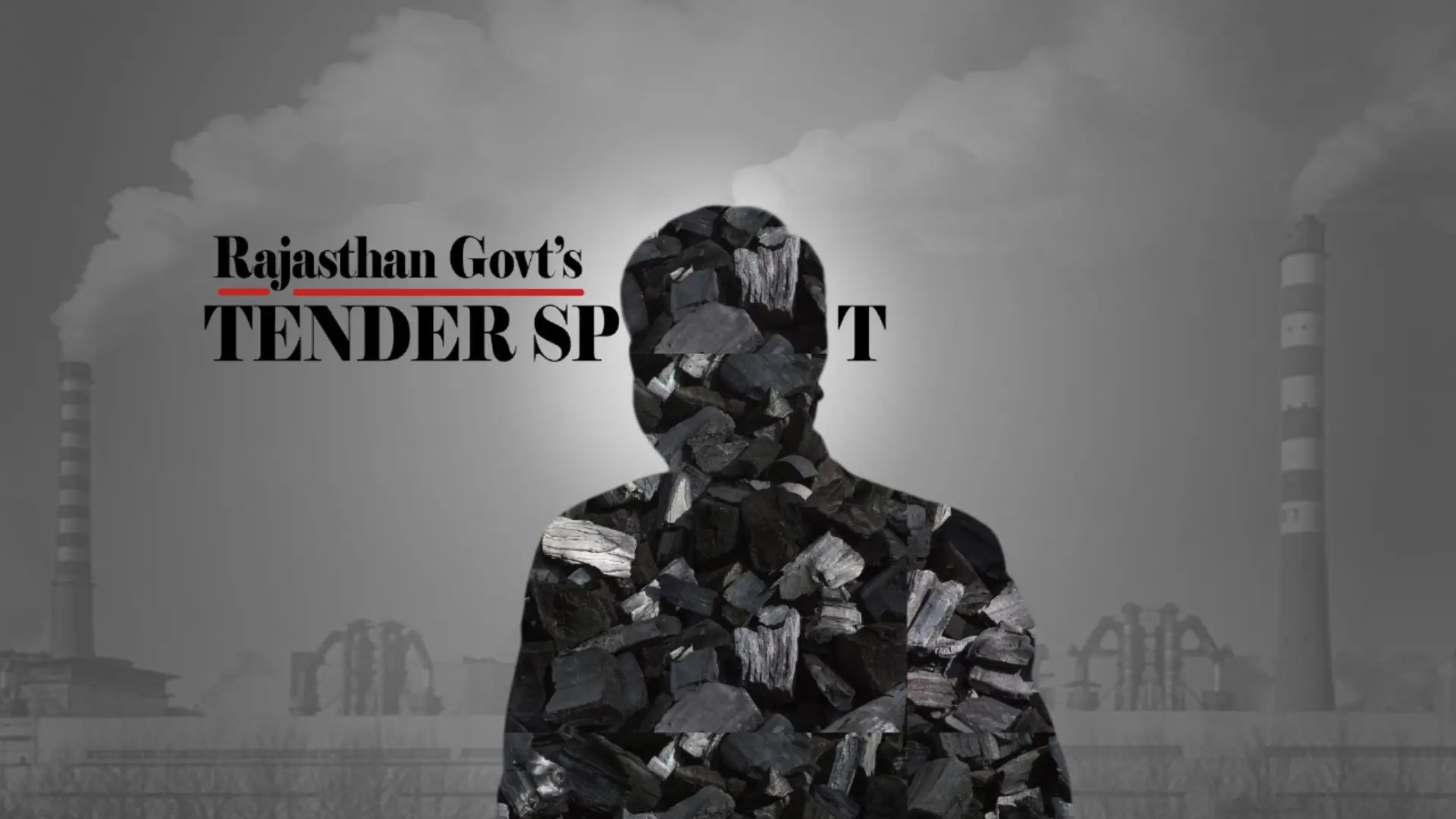
New Delhi: The Rajasthan state government has floated a tender for long-term procurement of 3,200 MW of power from coal-based thermal plants that any company sets up within the state boundaries. The tender has been put out without the mandatory approval from the Rajasthan Electricity Regulatory Commission (RERC). And, Adani Power Ltd is best placed to bag it. The company is in the preparatory stage of expanding its 1,320 MW Kawai Thermal Power Plant in the state by exactly 3,200 MW.
This gives the Adani Group a distinct advantage because the tender by the state’s Rajasthan Urja Vikas and IT Services Limited (RUVITL) stipulates that the entire capacity must be based in Rajasthan.
Moreover, the timeline set by the Rajasthan government for commissioning the project aligns well with Adani Power's preparations. The company has already placed orders for essential equipment for thermal power plants, making it difficult—if not impossible—for competitors to procure comparable items in time to meet the state's tight deadline.
In a call with investors, Adani Power has exuded confidence. The company’s CEO said on the call that the company had “Unparalleled competitive advantages coupled with the early-mover advantage” in cornering long-term power purchase contracts from several states governed by the BJP. Public limited companies, such as Adani Power, are required to hold such calls with their investors after each quarter’s financial results and open themselves to questions about the business’s prospects.
This is the second time that Rajasthan has tailor-made a power tender that the Adani Group could advantage from. The previous one got nixed after an investigation by The Reporters’ Collective and subsequent criticism by experts and other stakeholders.
This time around, the state government has put the tender out by pre-empting the Rajasthan Electricity Regulatory Commission (RERC)’s mandatory approval. The regulator is yet to decide, and has cited “data gaps” in the justification the state government has provided for the project, documents reveal.
Does the state need this much thermal capacity to come online, or does it already have enough? That is the question RERC was considering before RUVITL went ahead and floated the tender without its approval on October 1.
In June, the Central Electricity Authority (CEA), India's apex power planning authority under the Union Power Ministry, slashed Rajasthan's coal-based thermal requirement forecast for 2031-32 by 3,750 MW and projected additional procurement of just 1,905 MW over the next decade. The revised forecast cast doubt on the 3,200 MW tender, prompting the RERC to direct a committee to reassess the capacity requirement.

The Energy Assessment Committee (EAC), chaired by the principal secretary in the Rajasthan government’s energy department, concluded that CEA's projections were “conservative” and that after accounting for the retirement of some units, the state needs to procure more thermal capacities.
Still, stakeholders, including representatives of the Association of Power Producers, competing power companies, think tanks and civil society groups, questioned the committee's conclusions, with RERC reserving its final order on September 29 pending a reply to the concerns.
.webp)
The Rajasthan government, RUVITL, and the Adani Group did not respond to detailed queries. The story will be updated if they do. A representative from the Adani Group called after the queries were sent, and did not confirm whether a response would be issued.
From the First Scrapped Tender, the Second is Born
The 3,200 MW coal-based capacity was first offered by the Rajasthan government as part of a massive 11,200 MW bundled solar and thermal tender. This was scrapped after prospective bidders pressed the RUVITL to separate the two sources, citing the need for a competitive process, documents show.
In September 2024, The Reporters' Collective reported how the bundled tender appeared tailored to match the operational capabilities of the Adani Group, and was modelled on a similar tender in Maharashtra, which the Group had bagged.
In November 2024, the RUVITL’s board of directors ratified the cancellation of the 11,200 MW bundled tender and approved initiation of the exclusive tendering process for the 3,200 MW thermal capacity.
The bundled tender was shelved after prospective bidders requested to "segregate" the two sources to allow “experts of respective technology to participate in the respective tendering process, resulting in increased participation & competitive tariff,” according to the minutes of a board meeting.

The Adani Group was a frontrunner for the bundled tender, which required bidders to supply both thermal and solar power. The Group is the country's largest private player in terms of combined capacity. It is also expanding its coal-fired thermal power plant in Rajasthan's Kawai by 3,200 MW—identical to the tender requirement and meeting the criterion of being set up within the state, further whittling down competition. No power purchase contract has been signed for the Kawai expansion till now.
After scrapping the bundled tender, the RUVITL decided to invite bids exclusively for the 3,200 MW thermal capacity, dropping the solar component altogether. It was concluded that evacuating 8,000 MW of solar power would strain transmission infrastructure, and that the state government is prioritising decentralised solar generation instead, documents reviewed by The Reporters’ Collective show.
In December, the Rajasthan government’s finance department approved the thermal power procurement process, initially allowing the capacity to be within or outside the state. In February, the RUVITL petitioned RERC and sought approval for the tender documents, since they deviated from model bidding guidelines.
While it is not unusual for bid documents to differ from model guidelines, floating a tender without prior approval from the state electricity regulator violates the Power Ministry's 2019 guidelines on electricity procurement issued under the Electricity Act, 2003. It presumes the authorities will clear the way for what the state government desires.
Stakeholders Question the Need of 3,200 MW
The RUVITL's petition before the state electricity regulator is yet to be approved, primarily due to concerns over the EAC’s assessment that the state requires more capacity than the 1,905 MW projected by CEA over the next decade.

The need for the tender came under scrutiny after CEA slashed its forecast for Rajasthan's coal-based thermal capacity requirement for 2031-32 from 19,710 MW (projected in August 2024) to 15,960 MW (revised in June 2025). The revised resource adequacy plan also estimates coal-based capacity at 17,864 MW for 2035-36, still below the older 2031-32 forecast.
As of March 30, Rajasthan's contracted coal-based capacity stood at 13,425 MW, implying roughly 4,400 MW of net capacity addition would be required by 2035-36. After factoring in contracted capacities expected to come online, the revised CEA report estimated that only about 1,905 MW of additional capacity needs to be procured by 2035-36.
In its meeting on August 28, 2025, however, the EAC asserted that the CEA’s revised demand projections do not account for 1,350 MW of coal-based capacity set to retire after 2030, and that other contracted capacities are in “initial stages” with “issues regarding regulatory approvals… yet to be resolved”.
“In conclusion,” the committee said, “given the conservative nature of CEA’s demand projections and the observed higher growth trajectory in the State, it is prudent to plan for a thermal capacity addition of at least 4,440 MW, over and above the planned retirements of 1,350 MW.”


In a hearing of the RUVTIL’s petition, “stakeholders submitted that the proposed procurement is unjustified as several other upcoming capacities (new power plants) have not been included by the EAC,” the RERC noted in its record of proceedings on September 24. “It was also submitted that the EAC … has not given any clear recommendation for procurement of 3,200 MW thermal power for a period of 25 years.”
In the September 24 hearing, RERC directed the RUVITL to factor in upcoming plants in its demand estimates "since almost all stakeholders have raised the issue of non-consideration" of such capacities. Yet, a week later, and pending approval, the RUVITL floated the tender, with technical bids due by November 13.
Location Mandate and Commissioning Timeline also under Question
Another concern flagged by stakeholders to the RERC deals with the requirement that the plant be based in Rajasthan. Initially, there was no such stipulation, but in June, Rajasthan's Finance Department decided to mandate it, citing "social, economic and technical benefits" to the state — identical to the scrapped bundled tender.

Not only does that requirement give Adani Power an edge, given its ongoing Kawai expansion, but stakeholders told the regulator that “the transportation cost of coal will be significantly high, and in case of coal shortage, imported coal will be used,” potentially passing costs down to consumers. The capacity is linked to coal mines in Chhattisgarh under the Shakti scheme.
The timeline for commencement of supply—for all four units of 800 MW capacity each—is another bone of contention. Energy sector think tank Prayas submitted to RERC that the timeline has been extended to 42-60 months, compared to 36 months in the model guidelines.
“The rationale for such deviation is unclear. It should also be noted that even the proposed timeline of 42 months is unrealistic, with most new thermal plants taking over 5-6 years to be commissioned,” Prayas said.
Torrent Power Ltd, a potential bidder, requested to RERC that the RUVITL extend the timeline to 54-72 months, citing the need to procure equipment from Indian suppliers like Bhartiya Heavy Electrical Limited (BHEL) and Larsen & Toubro Limited, which have their "manufacturing capacities fully committed for the next few years". RUVITL rejected the request.
In August 2024, Adani Power had already secured a contract with BHEL to supply equipment and execute the Kawai expansion in two phases within 52 months, according to a BHEL disclosure.
Torrent Power also proposed capping the maximum bid size at 1,600 MW, or two units, to "reduce the risk of project development by a single developer". This request was also rejected by RUVITL.
According to its CEO, Adani Power will be bidding for several large, long-term power purchase agreements (PPA) for coal-based thermal capacities with states such as Madhya Pradesh (4,100 MW), Rajasthan (3,200 MW), Bihar (2,400 MW), and Uttarakhand (1,320 MW), incidentally, all under Bharatiya Janata Party-led National Democratic Alliance governments.
“We are highly confident that our unparalleled competitive advantages coupled with the early-mover advantage that we also possess, will help us to succeed in these bids,” CEO SB Khyalia said in an earnings call on August 1.
This is how it has begun unfolding. On August 29, Adani Power won the Bihar bid and was given the Letter of Award (LoA) by Bihar State Power Generation Company Ltd to supply power for 25 years from a 2,400 MW plant in Bhagalpur district. The opposition parties in Bihar have slammed the project in the run-up to the assembly elections over alleged favouritism.











